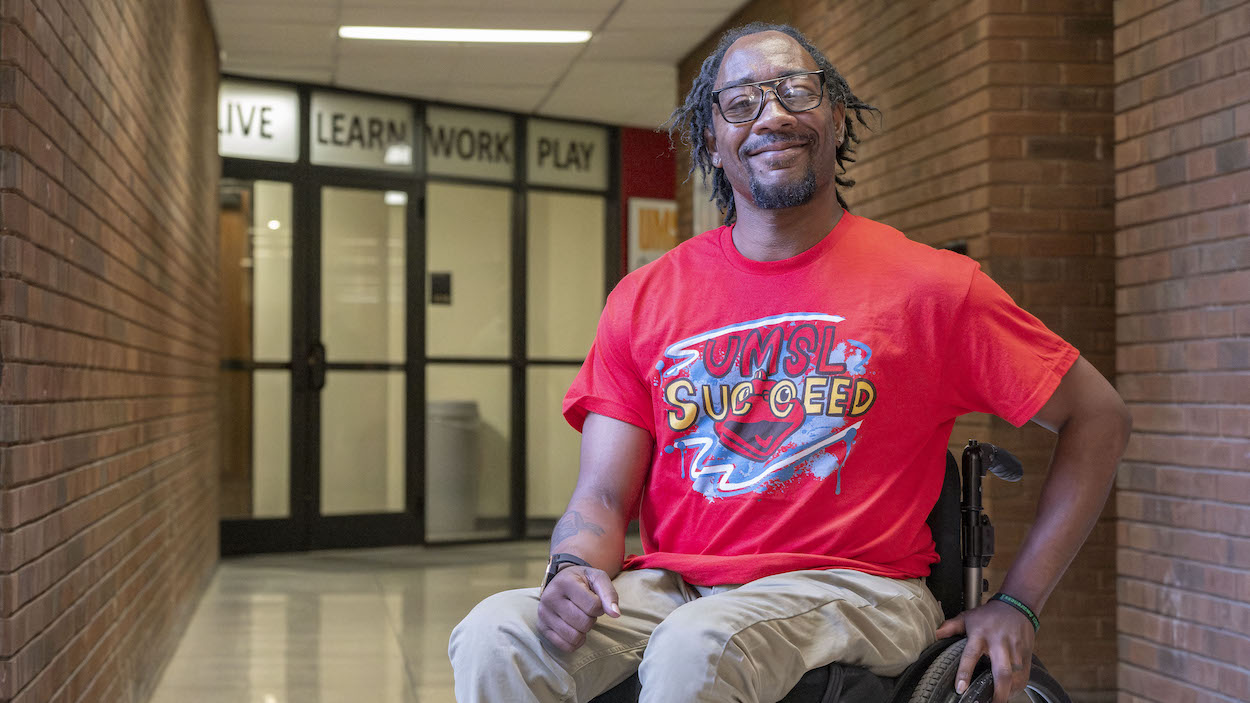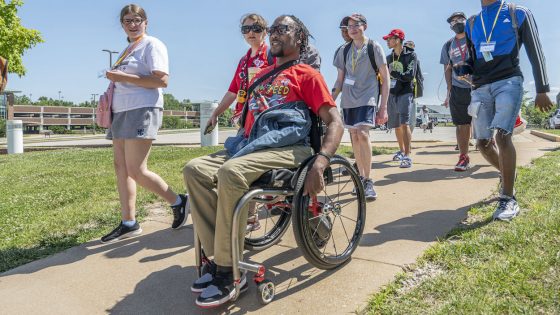
Dondi Baldwin, who will graduate in August with a bachelor’s degree in social work is currently completing a practicum with the Office of Inclusive Postsecondary Education’s Succeed Program. (Photo by Derik Holtmann)
Dondi Baldwin likes to say that he was doing social work before he knew it was social work. He hadn’t necessarily planned on it, but it was something life thrust upon him.
At the age of 32, Baldwin suffered a traumatic spinal cord injury. He was visiting with a friend on her porch when a stray bullet hit him. The injury paralyzed his legs, and during his recovery, he learned he would need to use a wheelchair for the rest of his life.
Baldwin was devastated at first, but he did his best to persist – for himself and his children.
“I reached out for groups where I could talk to people dealing with some of the things I was dealing with, and I really couldn’t find a lot,” Baldwin said.
Undeterred, he created the support he needed.
“I built a group of friends and a community of people that I met over the years,” Baldwin said. “We started a peer-mentoring support group.”
The group – consisting of others who are living with similar traumatic spinal cord injuries – has been meeting twice a month for the better part of a decade, first at the Rehabilitation Institute of St. Louis and now at Paraquad. During that time, Baldwin found he had a knack for helping people and facilitating group meetings. The experience inspired him to go back to school and pursue a career in social work.
This August, Baldwin will graduate from the University of Missouri–St. Louis with a bachelor’s degree in social work. He’s currently completing a practicum with the Office of Inclusive Postsecondary Education’s Succeed Program. After graduation, Baldwin hopes to find a full-time position in postsecondary education and also plans to pursue a master’s degree in social work at UMSL.
Growing up across the river in Cahokia, Illinois, Baldwin wasn’t too interested in academics. He left high school before graduating and found a full-time clerical job with a litigation law firm in downtown St. Louis, though deep down he knew he didn’t want to keep working in the legal field.
While Baldwin’s injury was a tragedy, it was also an opportunity for him to reevaluate his priorities. In 2017, Baldwin earned his GED and enrolled in community college. After three years of juggling advocacy, school and work, he earned an associate degree.
“I was loving going back to school,” Baldwin said. “I loved belonging to an institution.”
At the time, he was participating in Missouri Vocational Rehabilitation, a program that helps people with disabilities access resources and services to help obtain and maintain employment. His VR counselor encouraged him to continue his education.
Initially, Baldwin was uncertain about what direction to take academically, but then he considered what he was already doing outside of school and work. He had helped his peer-support group grow to 30 regular members, and among his family and friends, he became a trusted source of advice on topics ranging from access to medical supplies to social services. Additionally, he had helped an uncle with an intellectual disability find support and housing through organizations like Places for People.
“I was already going to these places for my uncle, and at the same time, I’m still going to support groups,” he said. “I’m already doing things in the community, advocating for people with disabilities. Why not go to school and get a job doing it?”
Baldwin entered the bachelor’s program in the School of Social Work around the onset of the COVID-19 pandemic. Tchule Moore, the BSW academic advisor, helped Baldwin schedule online courses that would work for his schedule and continued to offer guidance in-person once classes largely returned to campus.
UMSL faculty members have been equally accommodating as Baldwin balances working, raising a family and running a support group in addition to studying.
“All the professors that I met on campus have always been flexible,” he said. “College is mostly about just being accountable and being an adult. With all my professors, they are willing to help you, and I think they all really want you to pass and succeed.”
In classes with Associate Teaching Professor Diane O’Brien and Assistant Professor Annah Bender, Baldwin learned how to effectively speak with clients, actively listen and facilitate group meetings. He was then able to directly apply those lessons in real-world situations.
“Right after class, I would go to the group meetings, and I would practice,” he said with a laugh. “They didn’t know, but I was actually using the tools and skills that I just learned that day.”
He’s also putting those skills to use in his practicum with Succeed, where he serves as a coach and tutor. The College of Education program provides opportunities for UMSL students with intellectual and developmental disabilities to develop academic, living and vocational skills as they work toward a two-year Chancellor’s Certificate and potentially matriculate to a degree program.
Baldwin was instantly drawn to Succeed’s mission when Andrew Johnson Kliethermes, assistant director, and Heather Cowan, program coordinator for family and student support, delivered a presentation to his social work class.
He has already become a familiar face to Succeed students and a popular member of the organization. When he’s meeting with one of his students at the Nosh, other students will often try to pull him away or get his attention. To him, those interactions indicate he’s making a difference. They’re also what makes the practicum work so rewarding.
“I like building the relationships with them and seeing them succeed,” Baldwin said. “I think the organization is great. I understand why people come to the organization, but I really understand why people stay. They stay for the people.”
Ideally, Baldwin would like to be one of those people and stay with Succeed full-time, so he can continue making a difference at UMSL for the foreseeable future.















